Growing up, my friends and I were in the unenviable position of being first language English speakers who were enamored by Western culture. The life of eleven year olds that read Eragon instead of playing football was isolated, to say the least. The main escapes we had in a world where we attended thousands of hours of schooling without being able to communicate with our Malay-speaking teachers was reading and gaming. And the main game we played, on ancient hardware and dial-up connections, was Runescape, a small browser-based online game that was created by two brothers from their parent's house which somehow turned over £120M in revenue in 2022.
The world and community of the game have accumulated so many layers of history and nuance that I feel like I could muse for months without exhausting the well, and that's from someone who hasn't played in years. The game has existed with more-or-less constant development for over twenty years, and this has packed it lore and history. And of course, lessons, some of which I learned as a child and some which are only evident looking back as an adult.
There is the sheer delightful weirdness of the people that play into their adulthood, the unadulterated (a fitting word!) heart of the world and developers, the countless memories, and the community which has formed around the game. There's the absolutely awful design decisions, and how that didn't matter because the alchemy of music, passion, and children's imaginations nonetheless created a juggernaut of an experience that has survived the decades.
And looking back, the plentiful scams were a quick and painful lesson that there's an ugly side to humanity. There's the decidedly less delightful weirdness when you think about how much time some of those people spend clicking through an ancient browser game. There's the strange metamorphosis the game has undergone alongside its now grown-up players from a wondrous sandbox (and it still is, sometimes!) to an astonishing exercise in efficiency maximization, complete with exploiting the game engine's tick rate and a stock market. And of course, as always with the systems we live in, the acquisition of the company and how that seems to inevitably leak the bottom line into the player experience.
But yes, most importantly, the fact that I loved this game despite all that, and how I think it's a monument to what screwing around with a computer and your imagination can do for the world. I'm not sure what the exact pathway was, but I probably wouldn't be interested in writing or computers were it not for Runescape.
I almost didn't write this. To some large degree, this blog is my professional profile, and I was acutely embarrassed to be writing about something so juvenile even as I've just entered my 30s. I don't even play it anymore. At least my issues with the engineering world are mature, in topic if not in tone. But on the other hand, who cares? We're talking about a game where you click on rocks for hundreds of hours! Strap in for some nostalgia and contemplation!
I. A Brief History
The game has already lived through three iterations. There was the original Runescape Classic, now defunct, released in 2001, which looked like this:
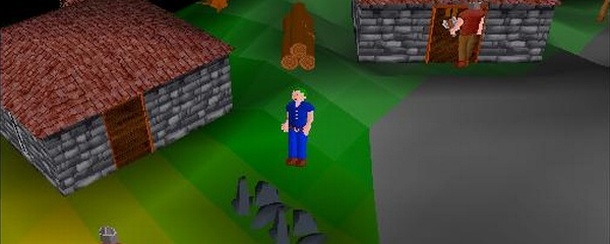
Oh baby, those are some cutting-edge graphics. I never played this version of the game, but I have to admit that it isn't quite as bad as I remembered. Classic was developed by two brothers and originally hosted out of their parent's house in Nottingham, which is delightful software lore. It reminds me very much of reading about the Discworld Multi-User Dungeon (a MUD; or text-based MMO) struggles with finding a home in the pre-cloud days:
The MUD was later hosted for a time at Trinity College in Hartford, Connecticut by one of its undergraduates: Michael "Bastian" Hammill. "Bastian" served as chief administrator of the game and "god" of Discworld (a character role), while "Pinkfish" continued in his capacity as head game developer. The school's IT administrator eventually ruled the project a hacking attempt due to multiple UNIX rlogin attempts from across the globe. This was actually just the game developers, or "creators", working as part of an international programming effort. The mistake cost the MUD another one of its homes.
In 2004, they released Runescape 2, which looks like this and immediately transports me to my childhood, clicking away happily but with minimal comprehension on my grandfather's computer, which I hazily recall was running Windows 98.
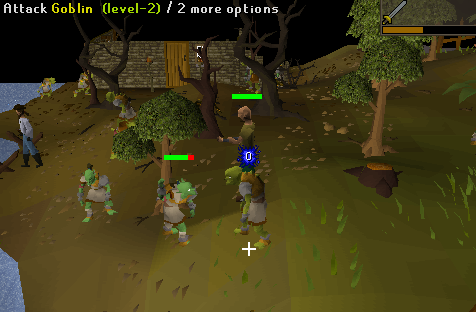
I couldn't even find an image of the game from when I used to play it, as I'm pretty sure that fellow in blue on the far left of the image was only added when I was in high school. I probably sank hundreds of hours into the game as a kid, which I regretted not spending on mathematics until I was 26, at which point I decided productivity obsession is for dorks. My first character was blastoise46 who has sadly been lost to the dreadful and manifold hazards of forgetting my password, forgetting which of my parents let me use their email address to make the account, and customer support never getting back to me on account recovery options1.
Eventually I stopped playing, but the game kept growing and the original company was acquired. They come out with Runescape 3, which looks like this:
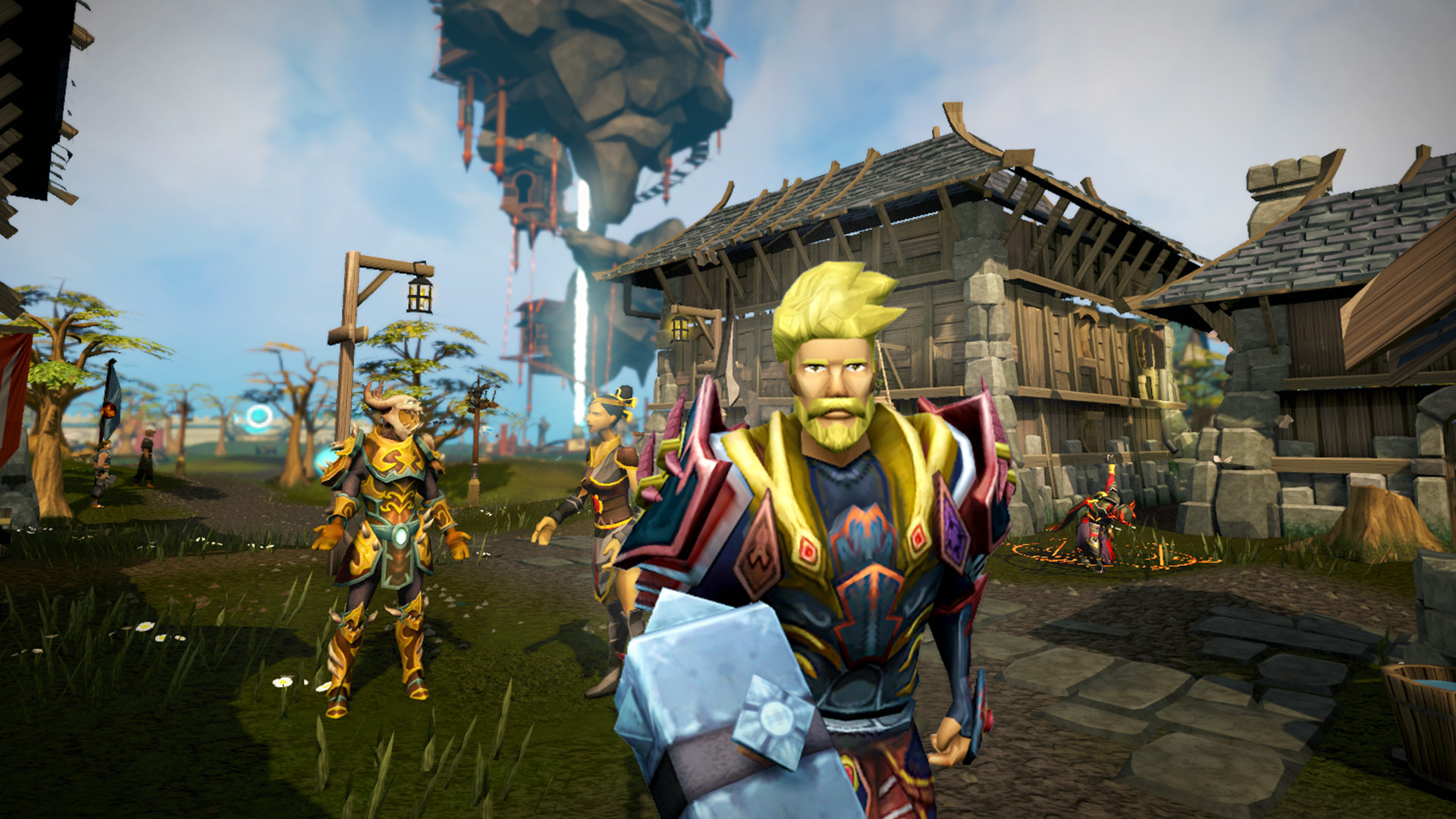
I've barely touched this, but despite looking much better, there's something off about it. It is mechanically improved in countless ways over the original, but in others ways it never sat right with me, like someone polished up the game without realizing what parts made it so charming in the first place. It's a strange, microtransaction-laden, gambling-encouraging mess, a part of my childhood resurrected into a well-dressed but nonetheless obviously-a-zombie that is lurching towards my wallet instead of my brains2.
Eventually, the developers release Runescape 2 once more, this time under the name Old School Runescape, restoring the game to its state circa 2007. It's usually called OSRS these days, and I'll largely be talking about OSRS or the older Runescape 2 for the rest of this.
II. Scams
The absolute first and most valuable thing you learn playing OSRS is that the world has some fucking bastards in it, that will say or do anything to benefit at your expense if they believe they aren't going to get caught. That's a rough thing to learn as a kid - and the internet is replete with accounts of people recalling how much they wept the first time someone stole their stuff in the game - but I'm sure glad I learned it with fake video game armor instead of NFTs.
The most famous scam was probably the old "trimming armor" trick, and the spirit of this trick underlies most of the way that people are going to try to steal your money. You see, all armor came in two variants - the normal version, and the gold-trimmed version. They looked like this:

The armor on the right, the "trimmed" version, was much rarer. The only issue with this is that there was absolutely no difference between these two sets of armor mechanically. Yes, one of these looked superficially better, but people were rational enough that they weren't going to spend piles of money on something that is exactly the same but more painful to lose when you died.
Just kidding, people were the same back then, the armor on the right was worth infinity dollars. But of course, with so many kids around and the concept of Googling things being a little bit hazier, most players had no idea how the gold-trimmed armor was produced. The truth is you can't produce it, it comes as a rare reward for doing certain activities in-game.
What you would run into in basically every town in the game was someone saying "Trimming armor!", "Trimming armor for free!", or possibly "Trimming armor 5k!".
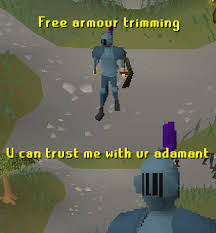
You would hand the player your armor, whereupon they would either:
- Promptly log out, never to be seen again
- Hang around and rub their victory in your face
I can't remember if this was actually the scam that made me realize how this particularly ugly part of the human soul operates, but it must have been something like this, and in retrospect a suit of fake mithril armor for such an incredible lesson was one of the best deals I've ever made. I must thank the scammer for it, wherever that dickhead is.
Young children do not actually perform any calculations around whether they're likely to lose their items when they hand them over - they just hand them over and are absolutely astonished to see that someone would simply take the item and disappear, cackling. To most children, this is a novel human experience, and for the first time you realize that there are people with calculated malice that you cannot fathom, and that there are domains where the God-figures of teachers and parents cannot answer prayers. Yes, you may cry, but you are met by baffled incomprehension and platitudes, but not your stuff back which is what you actually want. Ya fucked up, kid, sorry, happens to the best of us. Children are easily overwhelmed by their excitement and credulity. But there are some lessons to ponder even looking back as an adult.
The Last Psychiatrist3 is a blog with a few fascinating, if somewhat incoherent, articles on human psychology. One that I ran into early at university was The Dove Sketches Beauty Scam, which illustrated to me the value in occasionally being taken for a ride, particularly in amounts you can afford.
If some street hustler challenges you to a game of three card monte you don't need to bother to play, just hand him the money, not because you're going to lose but because you owe him for the insight: he selected you. Whatever he saw in you everyone sees in you, from the dumb blonde4 at the bar to your elderly father you've dismissed as out of touch, the only person who doesn't see it is you, which is why you fell for it.
Players were rarely hand-picked for the scam above (it was mostly blindfired into the masses and you'd let them self-select, like a Twitter account pumping NFTs), but there are still things to reflect on and learn from. For example:

Notice how he isn't wearing gold-trimmed armor? That's because people that could actually afford it didn't need to scam people for money! But kids get excited and flustered, and the next thing they know they've been unceremoniously welcomed to the real world - so glad you could join us, we keep the financial anxiety in the cupboard to your left.
Thankfully, adults are a lot smarter than this, and would certainly notice the incongruity of someone who claims to be able to produce something incredibly valuable day in and day out, but instead opts to stand around extolling their virtues and begging people to purchase it for a relative pittance instead of earning millions directly.
By the way, I'm a world-class business leader, and I've decided to make my very real secrets available to you for the low, low price of A$50 if you want my book or A$10,000 for a speaking engagement. If you'd like, I could also fill in as your CEO for say, a million dollars, and this company will have an embarrassment of profits, like you wouldn't believe. Oh, yes, I have plenty of experience running Salesforce migrations, and they were all successful even though you've never seen a successful one before. I'll do that for you instead of using that astonishing capability to repeatedly actually generate incalculable revenue and paying myself out of that. Out of the kindness of my heart, xoxo.
"Thought leaders" are, fundamentally, just saying "trimming companies for $500,000", and Runescape gave me the antibodies I need to not buy that5.
But there are other things to reflect on too. The property of a system that allows you to simply take someone's money and proverbially log out is explicitly supported by the cryptocurrency ecosystem, which literal children can tell you is a bad thing after the old armour trimming shenanigans, but miraculously is talked about as a largely positive trait instead of something extremely bad outside of very narrow circumstances. Yes, the government will take your money in some places, but so will armour trimmers and you won't have any recourse. Plus, a malevolent actor can still take your money with the highly sophisticated "crowbar to your knees until we stop getting invalid passwords" attack6.
I credit witnessing the endless profusion of scams in Runescape with laying the foundation for my critical thinking as an adult. There's a lot to learn from the threefold insights of realizing that truly shameless thieves exist, that some systems support their existence, and that there are systems inside your head that make you more likely to be taken in if you let them run wild.
III. Problem Shallowness
There is a catchy saying in software engineering going by the name of Linus's Law despite being written by a guy called Raymond. It is usually presented as:
"Given enough eyeballs, all bugs are shallow."
Or, framed in terms of real-world application, if enough people look at a thing, the probability that someone will have the correct two neurons primed to immediately understand and solve the problem approaches 100%. This is something that I had mostly assumed to be true in the video gaming community, which is why the re-release of OSRS has been startling to me.
The game was hardly unpopular, and while a large proportion of the playerbase was certainly quite young, there were many adults playing even in the early 2000s. I distinctly recall chatting, at the ripe age of 12, with a French elevator technician named omlette2112, and I'm not sure why that is seared into my brain. My assumption would have been that something approximating optimal play would have been achieved relatively quickly, particularly in a game where the main combat mechanic is simply click on monsters and waiting until they die, while periodically using a healing item.
However, the last time I read something about the game, there was reference to a phenomenon known as "prayer flicking", which simply did not exist when I used to play, and it is absolutely wild.
By way of explanation, players have access to a powerful set of temporary buffs that drain a resource called "prayer points". The most powerful example are typically called "overhead" prayers, buffs so strong that they appear above your character's head to indicate that they have become totally immune to an incoming damage type. This character is currently using Protect From Melee and can't be hurt by anything other than an arrow or a spell.
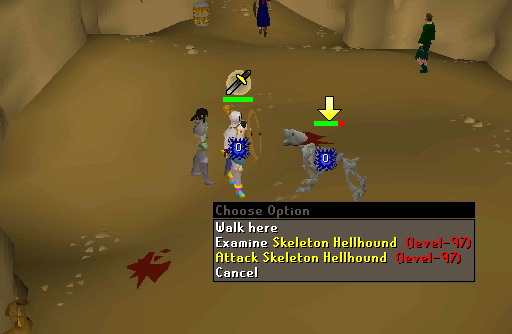
However, these drain your prayer points pretty quickly, otherwise people would just walk around immune to damage all day. Most enemies only deal one damage type, so they just can't hurt you at all. Hah, yeah, it would be absolutely nuts if someone found a way to just become immune to damage indefinitely. Half the content would become obsolete overnight.
You know where this is going.
Players worked out that the game updates its state once every 0.6 seconds (a "game tick"), for a total of 100 updates a minute. And if you turned your prayers on and off on exactly the game ticks where your character was going to receive damage, then you would get the immunity forever and never lose prayer points because the prayer wouldn't be on during the tick where the points should be drained. Huge portions of the game are now balanced around the fact that players are going to be immune to entire damage categories for extended periods of time, and a large amount of early content is completely obsolete.
I'm not even really sure how to think about this, because I am unsurprised that the concentrated power of the gaming world was able to brutally exploit an oversight in the game's original design, which again, was made by two brothers, the elder of whom was merely twenty five upon the release of Runescape 2. That makes sense.
What is strange to me is that it wasn't picked up in the earlier release of the game. I really thought we would have approached whatever critical mass of people you need to find the infinite health glitch back in the day. Yes, the playerbase is much older now, but still! There were many people around, and even putting that aside, kids are shockingly intelligent when there are video games to be won. A quick check reveals that the truly demented Tetris innovation of rolling was invented by Christopher Martinez at the ripe old age of fourteen, and I imagine we had orders of magnitude more people playing Runescape than Tetris. Still, interesting to think about - it's a profoundly hopeful thought that it's still possible to work hard and come up with novelties in a field that you would expect to be picked clean.
Incidentally, that doesn't tell the whole story, because prayer flicking this way could require players to be clicking for twice every 0.6 seconds, which would be unsustainable.
Once again, just kidding, of course that's what people have been doing. The human spirit is fucking indomitable, which is why we're going straight the hell back to the goddamn moon, you alien bastards, and why we spend thousands of hours collectively learning how to time our double clicks to preserve resources in an online game. This is the same facet of the human soul and you can't have one without the other. One day a human is going to be building the first human habitation on Mars, and at that moment there will be an equally dedicated sicko on earth working out how to improve his damage output in Runescape 7 by 5%.
On a more concerning note, here is a thirty second video demonstrating how to use animated elements on the UI to time your clicks correctly. Now imagine someone doing that for anywhere between a minute to an hour because it's more efficient than playing the game the way it was originally intended.
Back at university, one of my philosophy lecturers made the argument that performance enhancing drugs leave professional athletes back where they started (relative to each other) except with drug-induced side effects. Each individual athlete might want drugs to be removed from the sport and to stop taking drugs themselves, but there's no way to stop this from happening due to the incentive structure.
What I'm saying is that it seems crazy that everyone added "click about four times a second" as a requirement to play large portions of their favorite game, and forced the designer to work around this, but here we are.
IV. Stonks

The way that the game used to work when I was at school is that all trading between players happened manually. That is to say, you would log into the server named "World 1" and travel to a city called Varrock. You would then be greeted by up to two thousand people shouting out whatever they were buying or selling, and it was up to you to wade through that endless morass for whatever you wanted. I've frequently wondered how these norms are formed, but it was a fascinating exercise in self-organization.
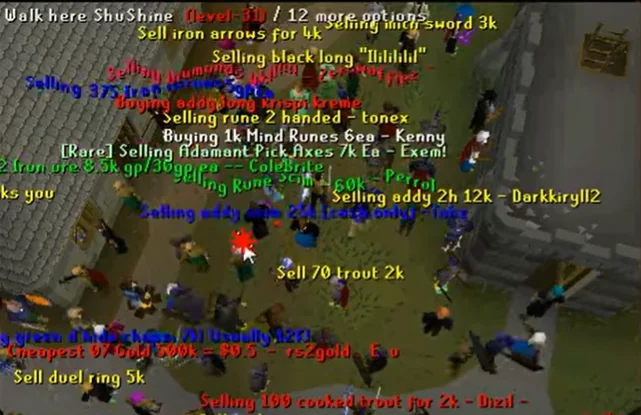
Looking back on all that weird, glowing text types that the developers made available, I can only say: "Wow, that is some 2004 energy." It's the sort of thing that is probably totally unwise to spend developer time on, it would not survive thirty seconds of feature prioritization at a more mature organization (even if I was doing doing the prioritization), and nonetheless all those sensible people must gaze on, absolutely stunlocked, as they fail to understand that terrible decisions like this are the fundamental magic, encoded a million times across what is probably a worse codebase than anything I've ever seen, that makes Runescape invincible and that puts so many well-reasoned experiences in the bargain bin of history through no fault of their own.
In any case, trying to buy items like this was quite the ordeal, and it was typically a lot simpler to actually play the game and try to acquire things yourself than it was to stand around asking for them. But this also felt unsatisfactory, because sometimes you'd really want to buy something and would have no idea how to convert all that hard-earned money into useful stuff.
Enter the Grand Exchange in 2007. The chaos of trading manually and desperately trying to draw attention to yourself was replaced with a bunch of people standing around, largely totally silently, placing orders on the fantasy stock exchange.
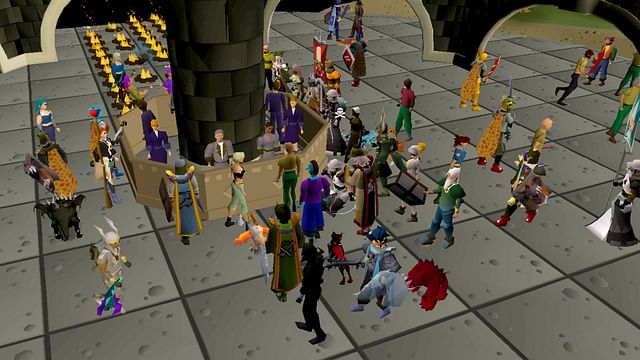
There's a certain nostalgia for the good old days where people actually hung around and talked to each other, but in retrospect that's hardly communication. It's mostly a bunch of people spamming as rapidly as possible when they'd much rather be doing something else, with too much noise for the possibility of a friendship to even develop after the transaction. But it did do something else weird to the game, which is that it became extremely easy to rapidly convert any given resource into any other resource, which means that to some degree, all activities are now fungible.
That is to say, I could go fletch a bunch of arrows to practice my archery, but it would be a lot easier to kill a bunch of cows because cow hides have undergone a massive price boost then convert those into thousands of arrows within a few minutes. On the bright side, I've saved myself a lot of time! On the not so bright side, I've sort of... sidestepped engaging with the game systems.
I suppose I don't have much of a problem with this, really, but I did think it was interesting how quickly I stopped playing the game after this update, even though it was basically a pure upgrade to my experience in material terms. There's probably some broader, very deep lesson here about how friction is an important part of some experiences. It brings to mind how, while having such an incredible ecosystem of Python libraries enables massive productivity, I always feel like I'm missing out by having the responsible solution to so many interesting problems be "use someone else's solution for it". Or all the time spent drilling footwork in fencing. While it seems obvious that I'd prefer that time back, and a Matrix-machine that downloads the preliminary steps into our brains so that beginners can enjoy the sport immediately would be great, I also can't help but feel that something very important would be lost alongside it.
Incidentally, this feeling is so widespread that a game mode was released whose largest restriction is that you can't use the fantasy stock market. People will pay for an account to turn the friction back on because the friction is the experience.
V. On Releasing Trash
This is a wonderful lesson for people that feel their work isn't good enough to share.
The absolute worst skill in any game is Runescape's Firemaking skill. The original iteration, which stuck around for years, was so mind-bogglingly stupid that I still get vaguely triggered thinking about it. It's crazy that the game went through three iterations and they never fixed the fundamental flaws with the skill, though they did eventually introduce some a minigame that let you more-or-less skip the skill entirely, which probably tells you all you need to know about how bad it is.
I suspect I know how it came about - the original developers imagined a large open-world with survival mechanisms, and making a fire is how you would fend off starvation and the elements. This is because every time my friends and I got together in primary school and brainstormed a game, we'd always end up with something like this. But there is no weather in Runescape, nor is there hunger, and the world is so small that it's fairly trivial to just walk to the nearest storage location and grab stockpiled food instead - you almost never need to cook food on an open fire. But they kept the Firemaking skill in anyway, because that's the sort of thing you do when you're designing a game to host from your parent's house.
So instead you've got a whole skill dedicated to settings logs on fire, with higher levels allowing you to set rare logs alight. The entire skill starts and ends with clicking on a tinderbox then clicking on some logs. At a rough guess, it probably takes around a hundred hours of repeatedly clicking on a tinderbox then logs to get your skill to the highest possible level. And of course, the benefit of lighting higher level logs is...
N o t h i n g .
Doesn't do a damn thing. Doesn't cook the food any better. Doesn't even burn longer, which would have been useless anyway since the normal logs last for long enough but how did this get overlooked? It's actually strictly inferior to have to leverage high level Firemaking because the trees are much rarer, and the fancy logs would have sold for more on the market. They just slapped this one in there and let it rip, and even made it compulsory to engage by gating quests behind the skill. Quests that usually don't even rely on the Firemaking mechanic! The game is riddled with all sorts of strange things like this, such as archery consisting of a single skill that determines your accuracy and damage, but melee combat being split into Attack (accuracy) and Strength (damage) for absolutely no reason. These are totally unparsimonious design decisions, and you know what?
That's fine.
The game did £120M in 2022, remember? People love it. Even making allowances for some of that revenue being driven by things like microtransactions, it's obviously a huge hit. It would probably be better if these things had been ironed out when it wasn't too late, but they just shipped the thing and didn't sweat all of those details too much.
There's a lot to be said for the broad skill of Practicing Finishing, but it's probably why the ability to Ship Something is valued so highly in engineering circles. Most people struggle to finish, whether it's writing a book or a piece of software, and that desire to flesh out every little flaw is frequently one of the major reasons. If they worried about all these details, they probably would have worked out that a browser game could never have lived up to their expectations, and the world would be down one huge collective experience. Some things have to be perfect, but almost everything doesn't.
VI. Bots
The game used to be packed to the brim with strange bald men in dark green pants. They all looked exactly like this.
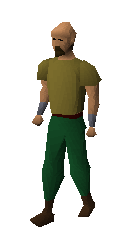
This is because the game was, and still is, extremely heavily botted. That is the default character. Just a million of these little guys zooming around, funneling endless piles of resources into the game's economy, mostly for the purpose of selling players in-game currency in exchange for real money. You'd frequently see them stacked up on top of each other on the exact same spot, all the lowest level, with absolute nonsense names.
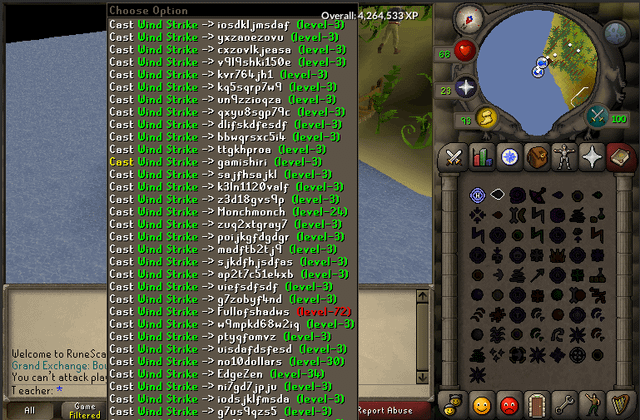
This was my first introduction to the idea of computer-assisted automation, and while I never botted myself, it was very direct exposure to the idea of an adversarial relationship existing between application developers and attackers. I suspect a great many of the people that converted the output from these bots into real-world money became the same people that try to launch attacks against our EC2 instances in an attempt to mine Ethereum.
Details on how the Runescape team tackles botting are very hazy, but I know enough to understand that they have developed a fairly high level of sophistication in-house, probably aided by the massive volumes of training data from the number of bots around. But it really is battling something like a serious criminal enterprise - it is not uncommon for accounts with paid memberships to get stolen through third-party database leaks. I still get phishing emails every so often trying to get ahold of an account I haven't touch in ten years. It's hard to know exactly how much money changes hands, but given that the people involved seem to have some level of technical ability and real money is involved, I am guessing that at least one person has genuinely been assassinated in developing countries over disrupting the bald men chopping down trees in the fantasy game, which is a fucking insane sentence.
This is largely why I was extremely paranoid from day one when I heard about the concept of compromising a machine to mine cryptocurrency. I had firsthand experience watching people exploit holes in systems to accumulate tiny amounts of money en masse. If there is a way to get $0.00000001 out of a system programatically, some guy is going to work out how to do it enough times to buy himself a car in the best case or a yacht in the worst case, but it'll be your money either way.
VII. EfficiencyScape and Money
It was brought to my attention a few years ago that Jagex had lifted any restrictions on "multiplaying", i.e, the act of logging into multiple accounts at the same time. My recollection is that this was disallowed when I used to play, as the idea was that it was unfair for one player to gather resources at several times the officially allowed rate. In fact, I believe it was also forbidden to even trade between your own accounts when I used to play - another life lesson was sometimes asking a friend to serve as a mule between two of your accounts, and their child-brains being overwhelmed at holding all your money, whereupon they would just decide to keep it and they'd never speak to you again. I can't remember if I ever did this to anyone, but I learn towards imagining I did and vowing to not be that guy again.
It is now not unusual to see people logging into several paid accounts at the same time, which could cost anywhere between $30 to $100 a month depending on how many characters you're juggling at the same time. The Youtubers I've seen who still play the game make frequent reference to playing more than one character at a time as if this is totally normal.
I suppose the first thing that's whacky is seeing that people are so hellbent on maximizing their efficiency that they're literally willing to pay to play multiple instance of the same game simultaneously. But you know, power to them, whatnot.
But the broader observation is that I can only assume this has been done because it allows the developers to earn way more money per player than they otherwise would, and I figure this must coincide with their numerous acquisitions over the years. It's sad to see, but I suppose people with millions of dollars to throw around don't acquire companies because they're passionate about the game, they do it because someone convinced them that the customers can be tapped for more money under new management. The suits involved probably don't even really understand the game, and instead get a vague rundown which fails to capture any nuance, entirely focused on the number of recurring subscriptions the product has.
This has manifested in a few astonishing blunders, such as a widely anticipated complete graphical overhaul being banned because the parent company was considering working on their own graphical overhaul at some undefined date in the distant future, which was eventually walked back in the face of massive protests. Things like this happen a lot in the gaming community, such as Sony getting absolutely owned over their decision to force Helldivers 2 players to have a PSN account, and the absolute nerds over at Wizards of the Coast getting obliterated over trying to make modifications to Dungeons and Dragons' famous Open Gaming License.
My favourite thing about the last is that Matt Mercer, who has done a huge amount for Dungeon and Dragons' profile over the past few years, seems to have taken the opportunity to create his own game, Daggerheart. It doesn't seem that interesting on first glance but it's crazy that some executive that didn't understand the community has decided to roll the dice on existential risk to a super profitable piece of IP. People really, really want their games to be more like Matt Mercer's.
In any case, behaviour like this shouldn't be terribly surprising from a company that sometimes supports microtransactions and in-game gambling, but it's astonishing how incompetently it was executed. To quote The Dark Knight, this city deserves a better class of criminal. But then again, maybe we should be grateful that the blast radius is limited by all the incompetents involved.
VIII. All The Good Stuff
There's clearly some dystopian commentary to be made on adults grinding out hundreds of hours clicking on rocks for levels in a game, but there's a bunch of entirely wholesome stuff to come out of the game too.
For one thing, it certainly cheered me up on many, many days as a kid when I was having a miserable time at school, and I have no idea how I'd have managed without that little bit of escapism. I must concede sadly that the new version of the game, where people use tick manipulation with knives and logs and axes to train two skills may not scratch that itch, but the original version of the game was something to behold. It's the only reason that I know that bronze is an alloy of copper and tin, that the end of an arrow is called fletching, and a thousand other little facts. And when I was deep in burnout8, I somehow ended up watching challenge playthrough from Jeporite where he tries to play the entire game while restricted to a tiny section of the map, and it really got me through some rough times despite being absolutely stupid as a concept.
The soundtrack is phenomenal and varied, and they've gone so far as to re-record some of the original MIDI soundtracks with an actual orchestra. Yes, it still absolutely slaps, although I have no idea what it sounds like to someone didn't condition themselves on it for hundreds of hours when their brains were still developing.
More broadly, I look back on the game as a spectacular, varied, imperfect work of passion. It has gone through so, so many iterations, ranging from the original DeviousMUD7:
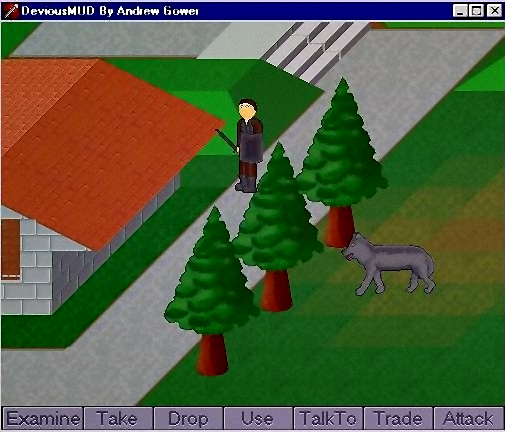
All the way to the latest iteration. If there's any doubt about that, just take a look at the world map used for the above version of the game:
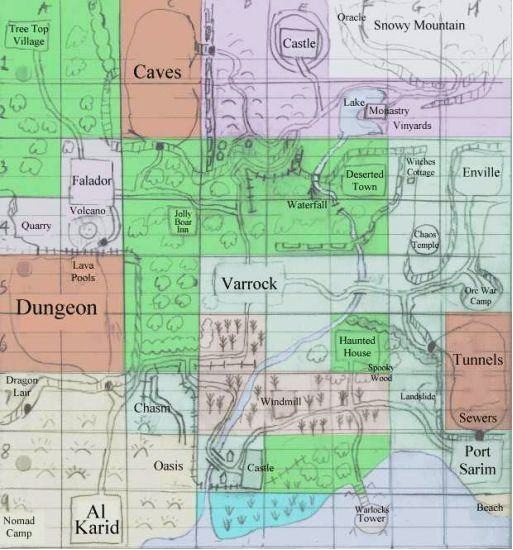
This little hand-drawn map is brimming with the energy which made the game the massive success that it is, which enraptured hundreds of thousands of kids across the world, and it is perhaps not terribly surprising that men and women in suits have trouble understanding that. I mean, look at it. It's dreadful, yet it is absolutely a better sales pitch for the game than any number of professional designers without any soul in the game can produce, which is why Runescape is a huge success and a dozen other MMOs with bigger budgets disappear every year. That core of passion is still baked in there, right next to the freehand square labelled 'Haunted House' with no additional context. The game oozes it. There's a whole feature where you can manually grind wheat in a windmill to create flour so that you can bake bread, an extremely slow and stupid process that basically no one ever uses because bread is worthless level one garbage, but it's in there because it sounded fun to the original developers.
And some of the developers there are the most beloved figures I've seen in any online community. OSRS has one person in particular, known as Mod Ash, who has been around since the very early days, and it is not an exaggeration to say that Mod Ash leaving the company on bad terms poses an existential threat to the business. If he were to get hired by a competing product and fully endorse it, many players might flock away, because his absolute commitment to the game and community over the years is considered to be beyond question at this point.
I believe he's the product manager for the game these days. Punching his name into YouTube yields "How Mod Ash Became The World's Favorite Developer". The comments say things like:
I wish Ash knew how much he meant to us. I truly hope he does.
and
I flew to Runefest from Sweden all alone just to get a picture with him. He is the Legend.
Have you ever seen people talk about a product manager that way? I know this community, they're usually feral ghouls. Get on his fucking level.
I do write quite a lot on doing meaningful work, but it's interesting to think about what that actually looks like. It's easy to imagine working on cancer cures, but compared to producing PowerBI reports, many things are valuable. They just need to align with a passion you have, once your other financial needs are both met and, ideally, minimized. For someone like Mod Ash, that's evidently treating one video game in the most soulful way a person can manage. Maybe the most important obligation that we have is simply to actually publish a game built off the map we doodled, or indeed, to write a blog post about a game from your childhood, or to otherwise do the thing that you know you want to but are holding back from.
Will McAskill once said, in defense of Effective Altruism, that the world can basically absorb infinite amounts of money and continue improving outcomes linearly - that is, two mosquito nets is twice as good as one mosquito net for a very, very large value of mosquito notes, but this is not true of buying yourself expensive cars. Whatever your feelings on the EA movement, that seems to be fairly obviously true. Similarly, I suspect that the world as it is has a limitless capacity to absorb authenticity and keep producing better outcomes.
I was going to sign off with the observation that one of the game's original founders, Andrew Gower, has had a mystery company that has had no output despite existing for fourteen years, and I was going to use it as an example of how extreme talent or vision doesn't lend itself to a repeat success. But it turns out that since I last looked last year, he announced what looks to be (essentially) Runescape 4, or Brighter Shores, presumably produced with the millions of pounds he got from the original acquisition but while retaining complete creative control.
Am I going to play it? Probably not, I think (sadly) the period of my life where my imagination ran so wild that I could be enraptured by pixels and MIDI soundtracks has run its course, and I'm busy these days. Busy with things I love for the most part, yes, but there's something bittersweet in not having the time to love more things.
But I'm glad that those mad bastards might let another generation of kids have the opportunity to let their imaginations run wild, and (lamentably but necessarily) get scammed. My accommodation during this trip to Fiji is right next to a school, and I can hear that generation right now, screaming at the top of their lungs and kicking a ball around the schoolyard while their teachers desperately try to keep them under control. Godspeed, you snot-nosed monsters, and I hope you have as much fun as I did.
-
I was still young enough that when I thought of cool, my brain went straight for favourite Pokemon. Note that it was not Charizard, because I am not basic. ↩
-
But I'm also being extremely biased. ↩
-
Who has always given off powerful casual misogynist vibes, and I've been more recently informed he has gone "full cult mode", whatever that means. I.e, I do not endorse the author broadly. ↩
-
Wow, there's the casual misogyny already! What a speedrun, great work team! ↩
-
This is why I've never been able to make myself read Simon Sinek despite all the recommendations - has he led anything other than his own marketing team? Because if he hasn't, we really shouldn't listen to anything he says, we should just start mimicking exactly what he does to make ourselves famous! ↩
-
I really like Bruce Schneier's writing on this. ↩
-
Yep, I found an even older iteration of the game while writing this. ↩
-
Which is a topic for another day, but it was miserable, and wholesome, nostalgic entertainment was very important for my brain. ↩